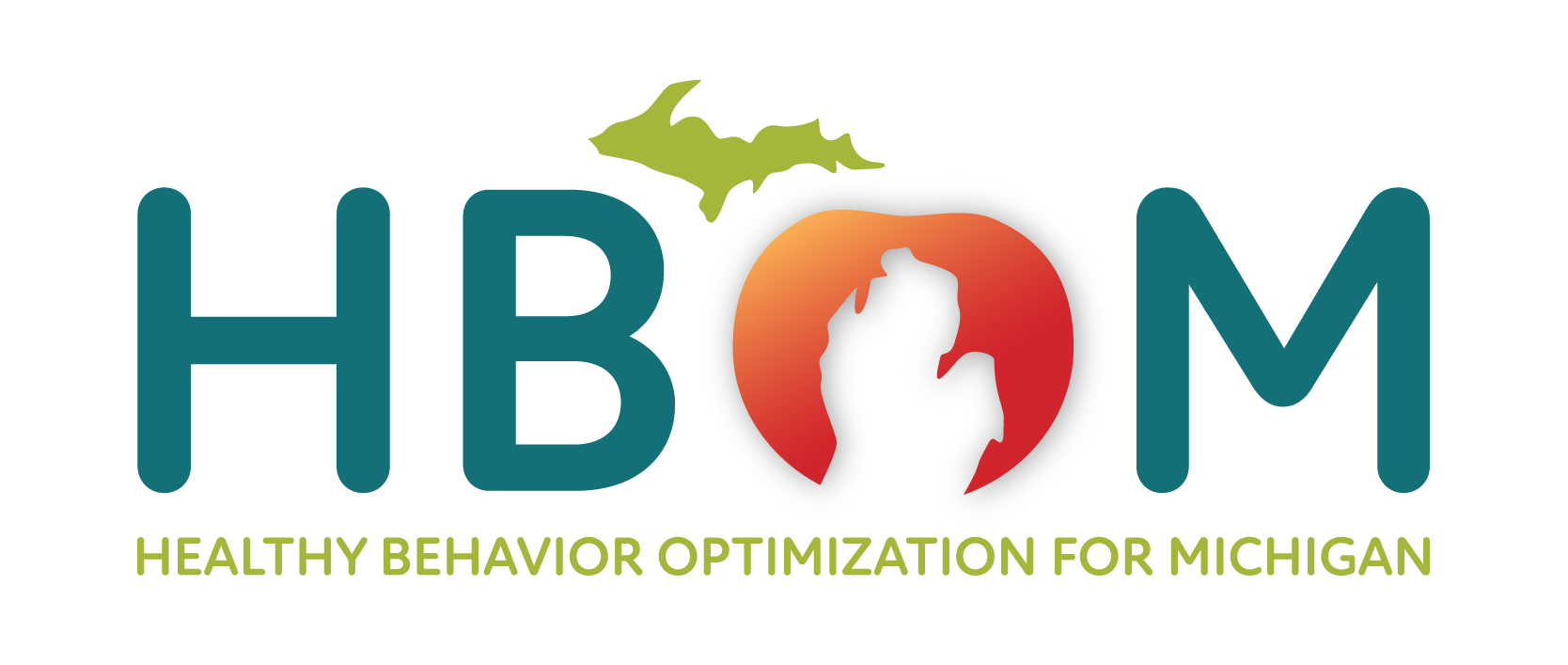
Mike Thompson, PhD, MPH, Co-Director of the Michigan Value Collaborative and Co-Director of the Michigan Cardiac Rehabilitation Network (MiCR) at their Bi-Annual Meeting in October 2022.
HBOM is proud to partner with the Michigan Cardiac Rehabilitation Network (MiCR) to support its efforts to increase utilization of cardiac rehab across the state of Michigan.
What is Cardiac Rehab?
Cardiac rehab is the gold standard in care after a cardiac event or procedure. Strong evidence shows that cardiac rehab programs can benefit individuals who have:
- Had a heart attack.
- Stable angina.
- Received a stent or angioplasty.
- Heart failure with reduced ejection fraction.
- Undergone a bypass, valve, or heart or heart-lung transplant surgery.
Cardiac rehab is a comprehensive secondary prevention program designed to improve cardiovascular health following a cardiac event or procedure. An optimal cardiac rehab experience consists of 36 one-hour sessions that include team-based supervised exercise training, education and skills development for heart-healthy living, and counseling on stress and other psychosocial factors (Mayo Clinic Proceedings, 2016).
From the CDC’s Million Hearts Initiative

Why Optimize this Healthy Behavior?
Participation in a cardiac rehab program can reduce the risks of death from any cause and from cardiac causes as well as decrease hospital readmissions. Cardiac rehab participation also improves functional status, quality of life, mood, and medication adherence (Cochrane Database of Systematic Reviews, 2016). Despite these benefits, participation in cardiac rehab remains low, ranging from 19% to 34% in a national analysis (Mayo Clinic Proceedings, 2016)
Individuals who attend all 36 cardiac rehab sessions have a 47% lower risk of death and a 31% lower risk of heart attack than those who attend only 1 session.
Hammill et al. Circulation. 2010
Who is MiCR?
Since 2019, the Blue Cross Blue Shield of Michigan Cardiovascular Consortium (BMC2) and the Michigan Value Collaborative (MVC) have been working together to improve cardiac rehab utilization. This collaboration has led to the creation of the Michigan Cardiac Rehabilitation Network (MiCR) with the aim to equitably increase participation in cardiac rehab for all eligible individuals in Michigan. To improve participation in Michigan and beyond, MiCR convenes with cardiac rehab providers and content experts to outline best practices and develop resources for facilities, hospitals, and health systems.
In 2022, MiCR published a Cardiac Rehab Best Practices Toolkit, a guide for physicians, hospitals, and cardiac rehab organizations, that identifies strategies and steps to improve enrollment and attendance. Outlined in the toolkit are initiation, maintenance, and innovation strategies all designed to aid clinicians in helping their patients get the most out of cardiac rehab.
MiCR hosts two stakeholder meetings each year to promote cardiac rehab best practices and allow for networking and knowledge sharing among members of its network.
Since 2019, the Blue Cross Blue Shield of Michigan Cardiovascular Consortium (BMC2) and the Michigan Value Collaborative (MVC) have been working together to improve cardiac rehabilitation utilization. This collaboration has led to the creation of the Michigan Cardiac Rehabilitation Network (MiCR) with the aim to equitably increase participation in cardiac rehabilitation for all eligible individuals in Michigan. To improve participation in Michigan and beyond, MiCR convenes with cardiac rehabilitation providers and content experts to outline best practices and develop resources for facilities, hospitals, and health systems.
BMC2 + MVC = MiCR
MiCR is led by Co-Directors Devraj Sukul, MD, MSc, and Mike Thompson, PhD, MPH. Dr. Sukul is the Associate Director of the BMC2’s Percutaneous Coronary Intervention (PCI) Quality Improvement Initiative (BMC2-PCI). Dr. Thompson is the Co-Director of MVC.BMC2 collects data on provider endorsement of cardiac rehab (referred to as a Cardiac Liaison). MVC utilizes episode-based claims data to capture CR utilization measures, which are reflected in hospital-level reports. Over the last 11 years, BMC2 has achieved a dramatic improvement in referral to cardiac rehab, from 64% in 2011 to 90% in 2020. However, significant opportunities remain to improve utilization of cardiac rehab once a referral is placed.

HBOM is Teaming Up with MICR

HBOM is committed to transforming health and healthy behaviors by applying a human-centered design approach to uncover and operationalize the pain points of our partners and to develop tools and services that advance their goals in new ways.
HBOM is excited to partner with the incredible BMC2 and MVC teams to advance their work to increase cardiac rehab enrollment and attendance. Over the next year, we will launch a suite of co-designed tools to support every member of the cardiac rehab pipeline, working to build confidence and candor in the cardiologist-to-cardiac rehab referral process, and establishing a best-in-class hub for patients new to cardiac rehab. Given our track record, we will also expand our experiments in public-private partnerships to address social needs and strive for equity in access to gold-standard foundational health care, like nutrition, preventive health services, and cardiac rehab.
In our current partnership with the Michigan Collaborative for Type 2 Diabetes (MCT2D), we have facilitated a proof-of-concept program connecting MCT2D patients who are food insecure with Healthy Choice grocery credits, provided by Shipt, delivered with a suite of tools to help individuals with type 2 diabetes jumpstart a new low carb lifestyle, with the tangible support of home grocery delivery and supplemental fresh and healthy, low carb groceries. The joint Jumpstart program has shown early success in improving patient-reported health behavior change, nutrition knowledge, and confidence in their diabetes management. HBOM believes that when CQIs work together, we can accelerate foundational health behavior change.

